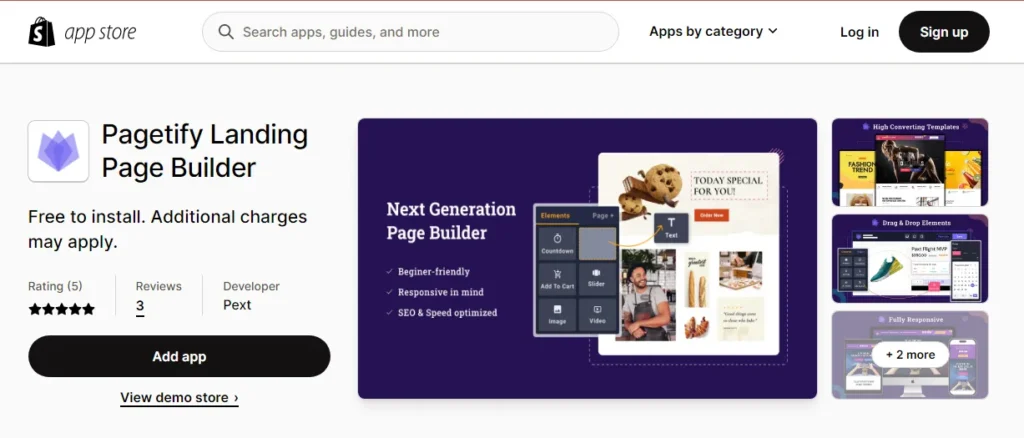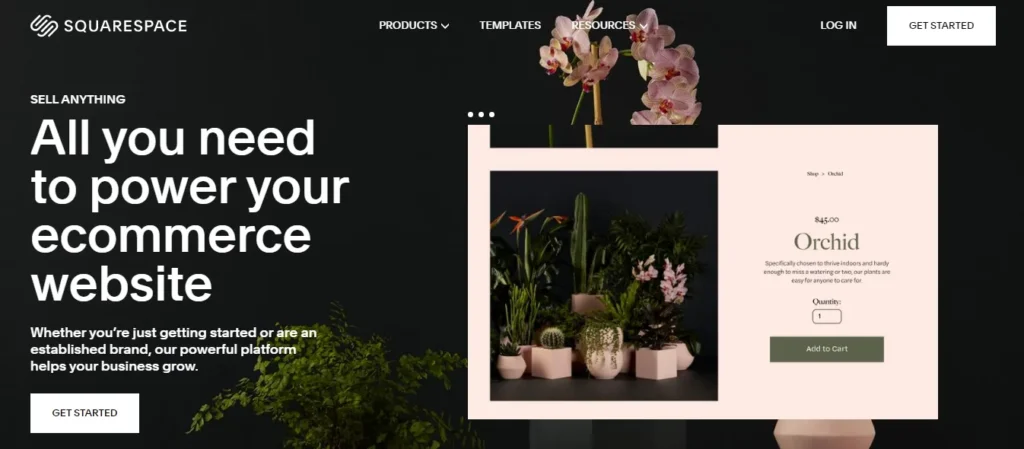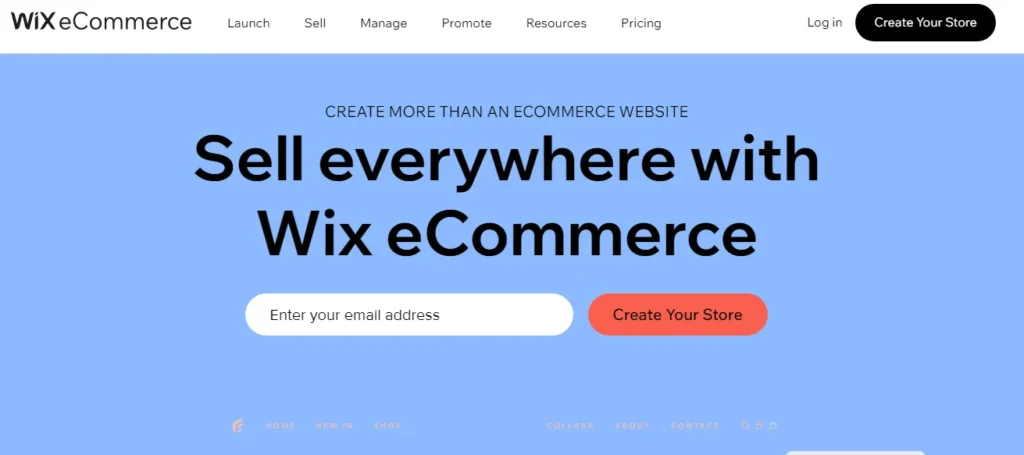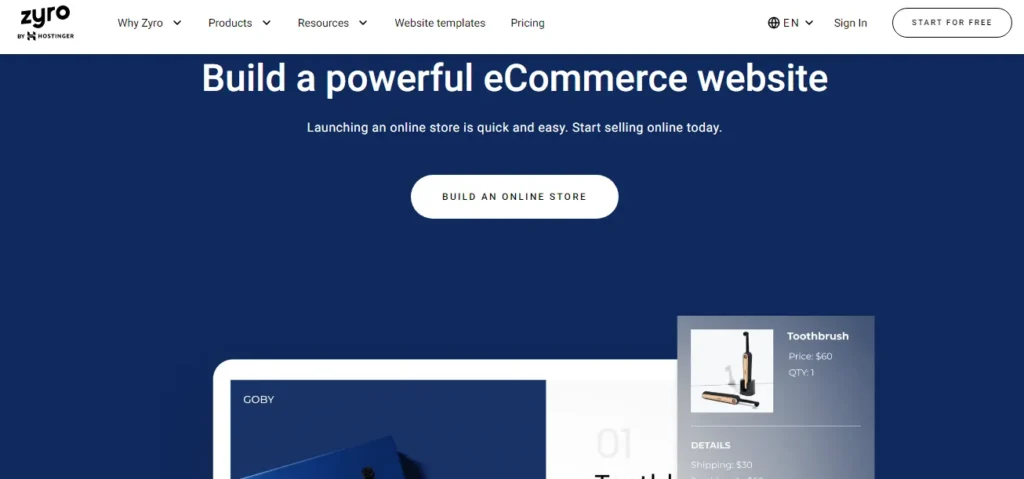9+ Best Ecommerce Website Builders [Reviewed and Ranked]
Before now, starting an ecommerce business can be a daunting task, especially if you are not well-versed in web development and design.
Fortunately, there are many ecommerce website builders available that make it easy for anyone to create a professional-looking online store.
In this guide, we will review the best ecommerce website builders and discuss their features, benefits, and drawbacks.
We will also cover frequently asked questions about ecommerce website builders and provide tips on how to get started with each one
What Is The Best Ecommerce Website Builder?
Here are picks for the best ecommerce website builders.
1. Shopify
Shopify is a leading ecommerce website builder that offers a variety of features and tools for building and managing an online store.

Some of the benefits of using Shopify include:
- A wide selection of templates and design tools to help users create a professional-looking store.
- Integration with payment gateways and shipping carriers, making it easy to manage orders and fulfillment.
- A robust app store with hundreds of apps that can be used to add additional features and functionality to your store.
- 24/7 customer support and a wide range of resources, including guides, tutorials, and support forums.
Pros
- Easy-to-use interface
- Wide range of templates and design tools
- Integration with payment gateways and shipping carriers
- Robust app store with hundreds of apps
- 24/7 customer support and a wide range of resources
Cons
- Some users may find the monthly subscription fee to be expensive
- The number of apps and features can be overwhelming for some users
How to get started with Shopify
- Visit the Shopify website and sign up for an account.
- Choose a template and use the drag-and-drop design tools to customize your store.
- Add your products and set up payment and shipping options.
- Use the app store to add additional features and functionality to your store.
2. WooCommerce
WooCommerce is a popular ecommerce website builder that is built on top of the WordPress platform.

Some of the benefits of using WooCommerce include:
- Integration with the WordPress platform, allowing users to easily manage their store and blog from the same dashboard.
- A wide range of extensions and plugins that can be used to add additional features and functionality to your store.
- A large and active community of users, offering support and resources for building and managing a store.
Pros
- Integration with the WordPress platform
- Wide range of extensions and plugins
- The large and active community of users
Cons
- May require more technical knowledge to set up and manage, as it is built on top of the WordPress platform
- Some users may find the costs of extensions and plugins to be expensive
How to get started with WooCommerce
- Install the WooCommerce plugin on your WordPress site.
- Follow the setup wizard to add your products, payment and shipping options, and other store details.
- Use the extensions and plugins to add additional features and functionality to your store.
3. BigCommerce
BigCommerce is a comprehensive ecommerce website builder that offers a wide range of features and tools for building and managing an online store.

Some of the benefits of using BigCommerce include:
- A wide selection of templates and design tools to help users create a professional-looking store.
- Integration with payment gateways and shipping carriers, making it easy to manage orders and fulfillment.
- A range of marketing and SEO tools to help users drive traffic to their store.
- 24/7 customer support and a wide range of resources, including guides, tutorials, and support forums.
Pros
- Easy-to-use interface
- Wide range of templates and design tools
- Integration with payment gateways and shipping carriers
- Range of marketing and SEO tools
- 24/7 customer support and a wide range of resources
Cons
- Some users may find the monthly subscription fee to be expensive
- The number of features and tools can be overwhelming for some users
How to get started with BigCommerce
- Visit the BigCommerce website and sign up for an account.
- Choose a template and use the design tools to customize your store.
- Add your products and set up payment and shipping options.
- Use marketing and SEO tools to drive traffic to your store.
4. Magento – Adobe Commerce

Magento is a powerful ecommerce website builder that is suitable for small businesses as well as large enterprises.
Some of the benefits of using Magento/Adobe Commerce include:
- A wide range of features and tools for building and managing an online store.
- The ability to create custom solutions and integrations to meet the specific needs of a business.
- A large and active community of users, offering support and resources for building and managing a store.
Pros
- Wide range of features and tools
- Ability to create custom solutions and integrations
- A large and active community of users
Cons
- May require more technical knowledge to set up and manage
- Some users may find the costs of custom solutions and integrations to be expensive
How to get started with Magento
- Visit the Magento website and sign up for an account.
- Use the design tools to customize your store.
- Add your products and set up payment and shipping options.
- Use marketing and SEO tools to drive traffic to your store.
5. Squarespace

Squarespace is a popular website builder that also offers ecommerce capabilities.
Some of the benefits of using Squarespace for ecommerce include:
- A wide range of templates and design tools to help users create a professional-looking store.
- Integration with payment gateways, making it easy to process transactions and manage orders.
- A range of marketing and SEO tools to help users drive traffic to their store.
- 24/7 customer support and a wide range of resources, including guides, tutorials, and support forums.
Pros
- Easy-to-use interface
- Wide range of templates and design tools
- Integration with payment gateways
- Range of marketing and SEO tools
- 24/7 customer support and a wide range of resources
Cons
- Some users may find the monthly subscription fee to be expensive
- The number of features and tools may be limited compared to other ecommerce website builders
How to get started with Squarespace
- Visit the Squarespace website and sign up for an account.
- Choose a template and use the design tools to customize your store.
- Add your products and set up payment options.
- Use marketing and SEO tools to drive traffic to your store.
6. Wix

Wix is a website builder that offers a variety of features and tools for building and managing an online store.
Some of the benefits of using Wix for ecommerce include:
- A wide selection of templates and design tools to help users create a professional-looking store.
- Integration with payment gateways, making it easy to process transactions and manage orders.
- A range of marketing and SEO tools to help users drive traffic to their store.
- 24/7 customer support and a wide range of resources, including guides, tutorials, and support forums.
Pros
- Easy-to-use interface
- Wide range of templates and design tools
- Integration with payment gateways
- Range of marketing and SEO tools
- 24/7 customer support and a wide range of resources
Cons
- Some users may find the monthly subscription fee to be expensive
- The number of features and tools may be limited compared to other ecommerce website builders
How to get started with Wix
- Visit the Wix website and sign up for an account.
- Choose a template and use the design tools to customize your store.
- Add your products and set up payment options.
- Use marketing and SEO tools to drive traffic to your store.
7. GoDaddy

GoDaddy is a website builder and hosting provider that offers ecommerce capabilities.
Some of the benefits of using GoDaddy for ecommerce include:
- A wide range of templates and design tools to help users create a professional-looking store.
- Integration with payment gateways, making it easy to process transactions and manage orders.
- A range of marketing and SEO tools to help users drive traffic to their store.
- 24/7 customer support and a wide range of resources, including guides, tutorials, and support forums.
Pros
- Wide range of templates and design tools
- Integration with payment gateways
- Range of marketing and SEO tools
- 24/7 customer support and a wide range of resources
Cons
- Some users may find the monthly subscription fee to be expensive
- The interface may be difficult to use for those unfamiliar with website builders
How to get started with GoDaddy
- Visit the GoDaddy website and sign up for an account.
- Choose a template and use the design tools to customize your store.
- Add your products and set up payment options.
- Use marketing and SEO tools to drive traffic to your store.
8. Volusion

Volusion is a comprehensive ecommerce website builder that offers a wide range of features and tools for building and managing an online store.
Some of the benefits of using Volusion include:
- A wide selection of templates and design tools to help users create a professional-looking store.
- Integration with payment gateways and shipping carriers, making it easy to manage orders and fulfillment.
- A range of marketing and SEO tools to help users drive traffic to their store.
- 24/7 customer support and a wide range of resources, including guides, tutorials, and support forums.
Pros
- Easy-to-use interface
- Wide range of templates and design tools
- Integration with payment gateways and shipping carriers
- Range of marketing and SEO tools
- 24/7 customer support and a wide range of resources
Cons
- Some users may find the monthly subscription fee to be expensive
- The number of features and tools may be overwhelming for some users
How to get started with Volusion
- Visit the Volusion website and sign up for an account.
- Choose a template and use the design tools to customize your store.
- Add your products and set up payment and shipping options.
- Use marketing and SEO tools to drive traffic to your store.
9. Zyro

Zyro is a website builder that offers a variety of features and tools for building and managing an online store.
Some of the benefits of using Zyro for ecommerce include:
- A wide selection of templates and design tools to help users create a professional-looking store.
- Integration with payment gateways, making it easy to process transactions and manage orders.
- A range of marketing and SEO tools to help users drive traffic to their store.
- 24/7 customer support and a wide range of resources, including guides, tutorials, and support forums.
Pros
- Easy-to-use interface
- Wide range of templates and design tools
- Integration with payment gateways
- Range of marketing and SEO tools
- 24/7 customer support and a wide range of resources
Cons
- Some users may find the monthly subscription fee to be expensive
- The number of features and tools may be limited compared to other ecommerce website builders
How to get started with Zyro
- Visit the Zyro website and sign up for an account.
- Choose a template and use the design tools to customize your store.
- Add your products and set up payment options.
- Use marketing and SEO tools to drive traffic to your store.
10. Selz
Selz is an ecommerce platform that allows users to build and manage an online store.
Some of the benefits of using Selz include:
- A wide range of templates and design tools to help users create a professional-looking store.
- Integration with payment gateways and shipping carriers, making it easy to manage orders and fulfillment.
- A range of marketing and SEO tools to help users drive traffic to their store.
- 24/7 customer support and a wide range of resources, including guides, tutorials, and support forums.
Pros
- Easy-to-use interface
- Wide range of templates and design tools
- Integration with payment gateways and shipping carriers
- Range of marketing and SEO tools
- 24/7 customer support and a wide range of resources
Cons
- Some users may find the monthly subscription fee to be expensive
- The number of features and tools may be limited compared to other ecommerce website builders
How to get started with Selz
- Visit the Selz website and sign up for an account.
- Choose a template and use the design tools to customize your store.
- Add your products and set up payment and shipping options.
- Use marketing and SEO tools to drive traffic to your store.
What Are Ecommerce Website Builders?
Ecommerce website builders are platforms that allow users to create an online store without needing to have coding or design skills.
These platforms provide pre-designed templates, drag-and-drop design tools, and a variety of other features to help users build and customize their stores.
Many ecommerce website builders also offer integrations with payment gateways, shipping carriers, and other tools that are essential for running an online business.
Benefits of Using Ecommerce Website Builders
There are many benefits to using ecommerce website builders, including:
Ease of use
Ecommerce website builders are designed to be user-friendly and easy to use, even for those who are not tech-savvy. Most offer drag-and-drop design tools and pre-designed templates, making it simple to create a professional-looking store.
Cost-effective
Ecommerce website builders are generally more affordable than hiring a web developer or designer to create a store from scratch. Many offer monthly or annual subscription plans, allowing users to pay as they go and scale their business as needed.
Variety of features
Ecommerce website builders offer a range of features, including shopping cart functionality, payment gateways, shipping integrations, and more. These features make it easy to manage and run an online store.
Mobile-responsive
Most ecommerce website builders offer mobile-responsive templates, ensuring that your store looks great and is easy to navigate on any device.
Frequently asked questions about ecommerce website builders
The cost of using an ecommerce website builder will vary depending on the platform you choose and the plan you sign up for. Most ecommerce website builders offer monthly or annual subscription plans, with prices ranging from a few dollars per month to several hundred dollars per month. Some ecommerce website builders may also charge additional fees for certain features or integrations.
Generally, no. Ecommerce website builders are designed to be user-friendly and easy to use, even for those who are not well-versed in web development. Most offer drag-and-drop design tools and pre-designed templates, making it simple to create a professional-looking store. However, some ecommerce website builders may require more technical knowledge to set up and manage, such as Magento.
Yes, most ecommerce website builders support the sale of both physical and digital products. Some may have specific features or tools that are designed specifically for one or the other, so it is worth considering which type of products you will be selling when choosing an ecommerce website builder.
Yes, many ecommerce website builders offer features and tools that make it easy to sell internationally, such as currency conversion and support for multiple languages. However, it is important to note that there may be additional fees or requirements for selling internationally, such as taxes and duties.
Conclusion
Ecommerce website builders are a great option for anyone looking to start an online store without needing to have coding or design skills.
In this guide, we reviewed some of the best ecommerce website builders, including Shopify, WooCommerce, BigCommerce, Magento, etc.
We also covered the benefits and drawbacks of each platform and provided tips on how to get started with each one.
Whether you are just starting out or are an experienced ecommerce business owner, there is an ecommerce website builder that can meet your needs.




